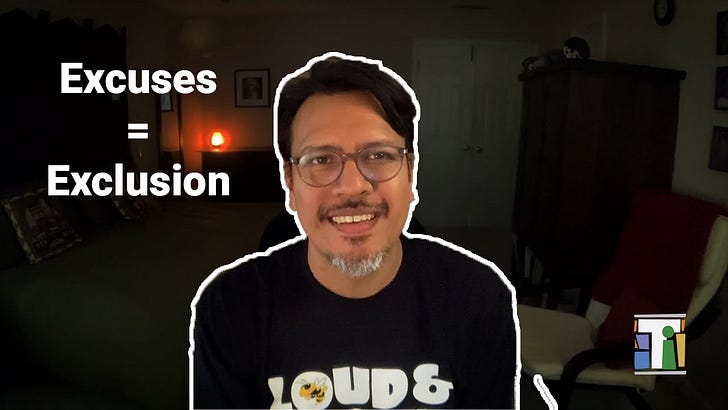Excuses = Exclusion
#NoExcusesNovember, how one school pursued inclusive education, and a Colorado parent's plea for inclusion.
Hey, Y’all.
My name is Tim Villegas.
#NoExcusesNovember
Are you tired of all the excuses for why schools can't implement inclusive education? Me too. And so is Dr. Jenna Rufo, author of Reimagining Special Education and recent guest on the Think Inclusive Podcast.
This month she is tweeting out common excuses for avoiding inclusive education along with a rebuttal.


[image description] This cartoon shows eight panels of the same person saying each of the following statements: "We tried that before.", "I agree philosophically, but…", "It costs to much.", "Our system is too big.", "Our system is too small.", "What we do now is just fine.", "I'm sure it works well in other places, but not here.", "It's against my religion.", and "It's not within my authority." The tag line under the cartoon reads, "Exclusion + Excuses = Excluses: Common reasons for avoiding inclusive education."
Here is one of my favorites of the series, responding to the excuse of "What could that student possibly get out of (fill in the blank - chemistry, Romeo and Juliet, algebra, etc.)?"


[image description] a blue ocean background; text reads: What do we expect any student to “get out” of our curriculum? How many students take chemistry but never become chemists? How many read poetry but don’t pursue writing as a career? How many children take art classes never to sculpt again once they leave school? Does this mean that their education was wasted? Of course not. We value participation in these subjects because it cultivates critical thinking, problem-solving, and collaboration. Students with disabilities deserve these opportunities as well. Yet, they must “prove” that they are worthy of learning a rich and challenging curriculum when no one else is held to that same standard.
Make sure to follow along with her tweets through the end of November.
California School Rethinks Resources to Implement Inclusive Education
Caliber ChangeMakers Academy, a charter school in Vallejo, California, adopted a no-excuses attitude and implemented changes to a more inclusive model for teaching and learning.
According to teacher Kimberly Berry, writing at EdSource.org, in 2019 the school
began intentionally organizing staff, time and money toward inclusion, and [they] did so without spending more than similar public schools do that don’t focus on inclusion.
She reports three steps that were important for her school to adopt inclusive practices:
Special education teachers each served as a co-teacher to two general education teachers, sharing the responsibility for classroom instruction.
Professional learning around inclusion was prioritized for all teachers, not just special education staff. And collaboration time was scheduled for general and special education teachers to plan engaging, differentiated instruction for all students.
The school prioritized hiring experienced social-emotional learning and mental health professionals, so special education teachers could narrow their focus to supporting instruction in classrooms.
To learn more check out the article from EdSource.
Inclusion Op-Ed
In an opinion article published in The Colorado Sun, Llyod Lewis, the president and CEO of Arc Thrift Stores, writes
Children and adults with intellectual and developmental disabilities should be included in all aspects of society.
And that he’s tired of the excuses as to why inclusive education isn’t the national expectation.
He goes on…
The fact is that the specifics of the Individuals with Disabilities Education Act have remained essentially unchanged for more than three decades. Segregation of children with intellectual and developmental disabilities in the classroom remains a major issue in our country, and in Colorado. Most children with these disabilities in our state are taught in segregated classrooms.
He references his 17-year-old son with Down syndrome who is taught in general education classrooms and has benefited from kind teachers, supportive staff, as well as his peers who have benefitted from his unique contributions.
Mr. Lewis brings up a great point about investing in teacher training and accountability. It is great if we expect more inclusive schools, but what good will it do if there are no clear consequences for schools that don’t?
Check out the article in The Colorado Sun.
That is it for this edition of The Weeklyish. Giving Tuesday is right around the corner, so look out for a special message just after the Thanksgiving Holiday in the United States.
Thanks for your time and attention!
Tim
ICYMI
How Ableism Affects My Life as a Non-Speaking Autistic
Self-Determination: More than Just a Set of Skills
Structural Ableism is a Barrier to Inclusive Classrooms
Podcast | Karrie Shogren & Sheida Raley | What Does Self-Determination Really Mean?
In The News
Biden Names Pick For Special Education Chief
Survey Finds Schools Failing To Offer Compensatory Services To Students In Special Ed
What I’m Reading

What I’m Watching
What I’m Listening To
What’s in my Timeline

From the Wayback Machine
10 Books Every Inclusionist Should Own





